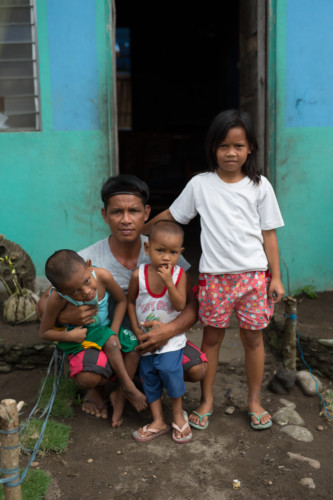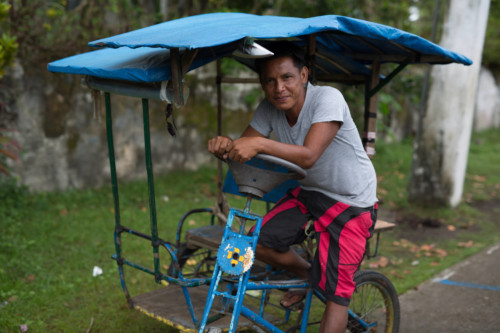The Life of a ‘Single’ Father
 It is a familiar story in the Philippines. When parents cannot earn enough in their local community to support their family, one or both of them must leave their children behind to find a job. Often a grandmother steps in to help care for the children, but that is not always an option.
It is a familiar story in the Philippines. When parents cannot earn enough in their local community to support their family, one or both of them must leave their children behind to find a job. Often a grandmother steps in to help care for the children, but that is not always an option.
Ernesto has found himself living as a single father. Unable to support their family in their local village, his wife Jonnalyn made the difficult decision to move to Manila where she was able to find employment as a maid. Months go by before she is able to visit.
Ernesto had to rise to the challenge of raising their three children alone. His task is even harder as he has two jobs. In the mornings, he sells sweet bread rolls called pandesal. Afterwards he drives a pedicab.
To cope with his heavy responsibilities, Ernesto adheres to a strict schedule of cooking, baths, laundry, and cleaning. His nine-year-old daughter, Princess Lorraine, is growing up fast as she helps with many of the chores.
His seven-year-old son, Ernesto Jr, is unable to go to school because he is developmentally challenged and experiences constant involuntary movements.
Last year, ADRA began a new project in Ernesto and Jonnalyn’s community. The EMBRACE project is a comprehensive program that will improve maternal and child health in Rwanda, Myanmar, Cambodia, and the Philippines. Approximately 100,000 people will benefit from lifechanging lessons in nutrition, hygiene, sanitation, health care, and childcare.
EMBRACE is possible because of a $20 million grant from the Government of Canada, provided through Global Affairs Canada, and the ongoing support of our generous donors.
Ernesto and Jonnalyn both joined the project, but Ernesto now attends alone. He shares whatever he has learned with his wife and his daughter. The lessons span topics such as handwashing, proper waste disposal, how to protect food and water from contamination, and more. Each lesson has a direct application in their daily life, contributing to healthier living.
 Ernesto is especially excited about the nutritional training that he is receiving. Using the seeds, tools, and agricultural training, he will be able to provide his family with healthy food from his own kitchen garden.
Ernesto is especially excited about the nutritional training that he is receiving. Using the seeds, tools, and agricultural training, he will be able to provide his family with healthy food from his own kitchen garden.
ADRA has been using small kitchen gardens for many years to improve the nutrition of families. Kitchen gardens are environmentally friendly and enable families to plant sufficient amounts of nutritious food with low cost and maintenance. Besides contributing to the elimination of malnutrition, kitchen gardens also enable soil conservation and restoration, increase biodiversity, and build families’ knowledge of positive and sustainable farming techniques. Kitchen gardens enable families with low incomes to access nutritious vegetables year-round and some are even able to earn additional income from excess produce.
Ernesto is thrilled to have the additional support provided by the EMBRACE project as it is helping him cope with his ‘single’ father status.
“Thank you, ADRA,” he says. “Without this project, we would not have learned these new things.”
Let's make a difference together!
Related News and Stories
- News Releases, Stories
- News Releases
- News Releases, Stories
- News Releases, Stories